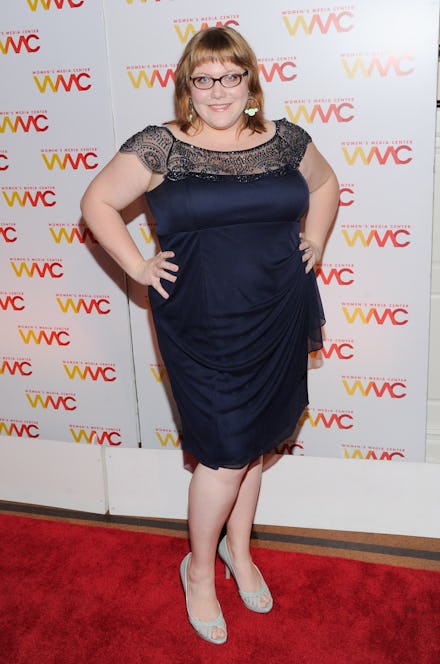Lindy West's 'Shrill' Inspires Empathy and Laughter All at Once

Author Lindy West, previously an essayist for sites like Jezebel and GQ, spun her latest and best essays into a hardback book that reads like you're walking around inside her internal monologue. Shrill: Notes From a Loud Woman will leave both existing fans or those who haven't yet listened to her appearances on This American Life laughing — and touched.
Through Shrill's 19 essays, West writes about feminism, her abortion, Twitter trolling and fat shaming, all with humor and empathy. Put down in her childhood, indirectly ridiculed by her boss and targeted on the internet, Lindy still manages to laugh about it, but also forgive and accept the perpetrators for their flaws. She even forgives Disney's failure to create "young, funny, capable, strong, good fat girls."
But what makes this book worth reading is her acceptance of herself: "This is my body," she writes. "It is mine. I am not ashamed of it in any way. In fact, I love everything about it."
For me, there are two essays of note: "Are You There Margaret, It's Me a Person Who Is Not a Complete Freak," and "Hello, I Am Fat," a letter to fellow writer Dan Savage. I felt the same pressure to grow up without really wanting to that West expresses in "Margaret" — shaving my legs, finally getting my period, no longer referring to time with my friends as "playing" but "hanging out." But I also didn't realize how angry I was about "the fact that, in America in 2016 (and far more so in 1993), acknowledging the completely normal and mundane function of most uteruses is still taboo," as Lindy yells. By the end, I felt like I was screaming right alongside her.
While "Margaret" is heated, "Hello, I Am Fat" is an anthem for confidence — confidence I want to possess for myself. I've struggled with body dysmorphia for most of my adult life. I honestly think, if I spent half as much time worrying about my body and what other people think of my body, I could gain back 12 hours of my day. West's essay reminds me that non-thin bodies are not evil. Healthy bodies are good. As West explained to Salon's Amanda Marcotte, "We're trained to see fat people as like thin people who are currently failing. ... And you're trained to see yourself like that."
I didn't realize how angry I was about "the fact that, in America in 2016 (and far more so in 1993), acknowledging the completely normal and mundane function of most uteruses is still taboo," as Lindy yells. By the end, I felt like I was screaming right alongside her.
West's candor refocuses the shapes I see. And if you have ever judged others' weight, Lindy's words will resonate and challenge you, because "you know what's shameful? A complete lack of empathy."
While Shrill is part pep talk, part required reading if you need a long hard look in the mirror, it's also a laugh-out-loud, memoir-esque read. It will easily find a home on a shelf next to Lena Dunham, Amy Poehler and Tina Fey's books.